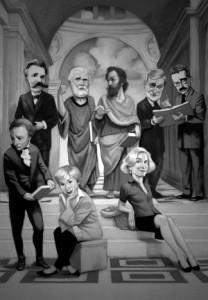Why Study Philosophy?
Philosophy students enter the conceptual universe of questions that have concerned human beings for millennia, which also enables them to gain acquaintance with some of the greatest thinkers of humanity. However, philosophy is not only about receiving information about philosophical discussions and debates, nor even about simply repeating mechanically ‘philosophical doctrines’. As Kant famously said, philosophy cannot be learned, for we must rather learn to philosophize. This means that one must learn to pose philosophical questions and thus acquire the ability to deal with philosophical problems that have been discussed since ancient times, but that continue to have relevance in today’s world. In every epoch, philosophy takes up the most vexing questions that have concerned thinkers and scientists alike, and it is above all a philosophical crucial task to be able to determine which problems are those that belong to our present era.
In this sense, the abilities that can be acquired by means of a proper philosophical training are highly relevant today. Specially because these abilities never become obsolete:
- The ability to think and write clearly.
- To argue with conceptual precision and logical clarity.
- To explain complex ideas and itemize analytic arguments.
- To distinguish fallacies and illegitimate arguments.
- To draw connections and implications between ideas.
- To be aware of conceptual history and the many transformations and depth of concepts.
- To critically analyze problems.
- To defy orthodoxy and dogmatism.
- To call into question mystification and recognize ideological strategies.
- To place discussions in a wider context.
The previous list of fundamental abilities confirms that philosophy can never be irrelevant inasmuch as these abilities can be applied to various professional and scientific environments. It is rather usual that the abilities acquired by a philosophical training enable professionals to delve deeply into their own areas of expertise, in which they have been trained. Therefore, philosophy improves the lives of those people who practice it professionally, but also of those people who wish only to learn about what has been thought and what deserves to be thought.
Philosophy, as a force of humanity, says the most positive about itself in that it debunks every idol, even those idols that actually pretend to be thought, but are not.
In the first paper published in our Philosophy Journal by one of the school’s eminent thinkers, Constantino Láscaris, we read:
“The rapture of philosophy is consolation in the face of death, but not in the face of life, for philosophizing is to open our eyes too much and to see what normally can only be glimpsed: the vacuity of our rationalization of the world.” (‘My First Testament’)
The School of Philosophy is the ideal place for getting a proper philosophical training in Costa Rica in one of the most prominent Latin American universities. Our School is the oldest and the most prestigious in our country and has been home of some of the most remarkable thinkers in Costa Rica.
More on the current relevance of philosophy:
· Why Study Philosophy? >>>



